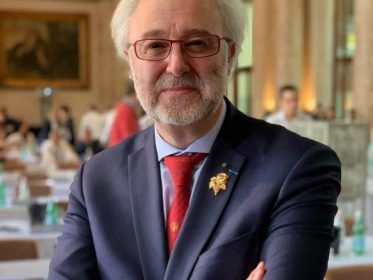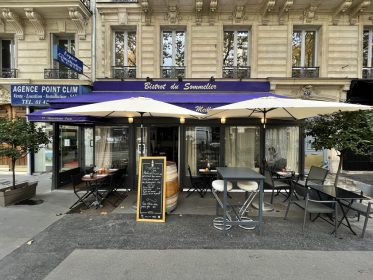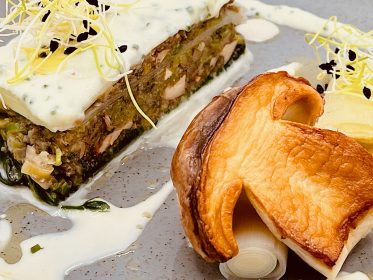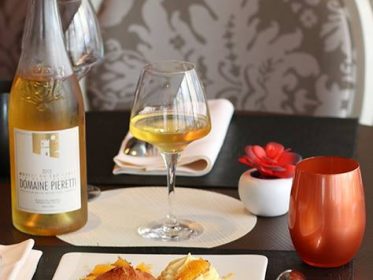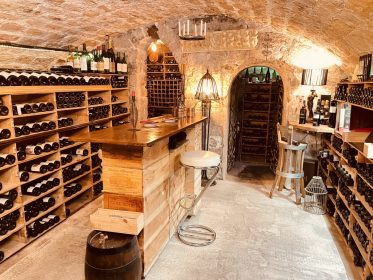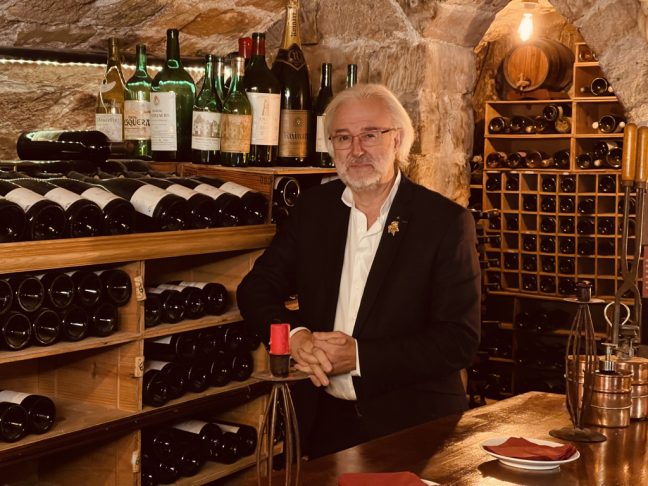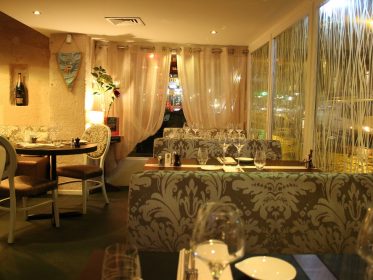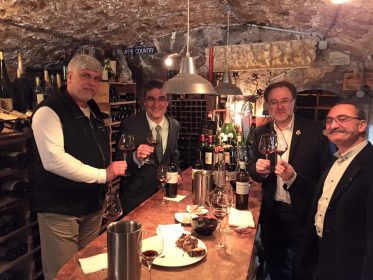Philippe Faure-Brac: “In the end, the whole wine world should be about inclusivity, gathering together, quality communication, conviviality and passion for good wines!”
President of the French Sommelier Association (U.D.S.F) since 2016, Best Sommelier of the World 1992 (Rio, Brazil), Best Sommelier of France 1988, Best Young Sommelier of France 1984.
In 2000, he created the sommelier’s exam “One of the Best Craftsmen of France” sommellerie class and has been its president since its inception.
Officer of the Order of Agricultural Merit (2018), M.O.F. Honoris Causa medal of the prestigious “Meilleurs Ouvriers de France” (2015).
In May 1984 at 24 years old, he opened the Bistrot du Sommelier*, a restaurant in Paris with an extensive wine list, which he has managed for almost 40 years.
* From the first days of opening, his restaurant has won the favor of the public, Philippe FAURE-BRAC welcomes his customers in a warm atmosphere, advises them with care and ensures the supply of the cellar. It is a wine restaurant, a place dedicated to the harmony of wines and dishes.
It is at 97 Boulevard Haussmann that Philippe Faure-Brac wrote the first page in the history of the Bistrot du Sommelier and this had an impact on the whole French sommellerie world!
Philippe challenged himself to be one of the first sommeliers to launch his own restaurant around wine, with thousands of wine references from all French and international vineyards on the menu.
In 1987 Nadine Padovani Faure-Brac joined Philippe and both endeavored to develop their restaurant without neglecting their careers while still being present and active within the wine industry.
Philippe publishes many books at Chêne /EPA/Hachette-Livres edition, the most recent are EPA Wine & Food Pairings (2020), An unusual game about wine “600 questions about wine” (2016), VINITOUR, the game on the wine route of France (2014). Etc. From 2004 to 2017 co-host every weekend of the show presented by Alain Marty: “IN VINO” on BFM Radio. Being very active in his career, there are many more projects and accomplishments, but they will stay beyond this article.
Being a President of the French sommelier association
Tell us a bit about your personal aims and goals within the French sommelier association?
This is not about a certain goal, this is more about philosophy. The purpose is to make the sommelier job greater, to make it shine all around the world. It is not so well known as a chefs or as a restaurateur position, but I am very passionate about it and I see it as my main duty and task to make it shine.
So we try to explain to the general public what it means to be a sommelier. It is important not to mix it with other wine experts’ jobs, to differentiate it and give it a proper place and recognition.
Role of sommelier and international competitions
Philippe, you very often act as a judge in local and international sommelier competitions, what skills are essential for sommeliers, what criteria you use in evaluating their work?
The main specificity is the link between different aspects in the industry, for example you need some technical knowledge, related to winemaking science, but you also need proper soft skills to contact a customer in a proper manner. And the sommelier is united by many links and aspects of the knowledge.
This links it not solely to the wine industry, and service and hospitality industry. A sommelier is responsible not only for wines, but also all other sorts of beverages, including tea or water, so they have to have technical knowledge of all the beverages. Moreover, gastronomy and the art of food pairing, on top of that great service and people skills.
When I act as an expert and judge for sommelier competitions and international contests, of course, there are certain criteria on how we are evaluating sommeliers.
There are two main aspects of judging in a contest, the first one is the official developed greed and standards for this job, there are points allocated to each criteria. That is very official and all these greed and standards are known in advance specifically developed for the judging committee. However, there is a second aspect of judging which is to evaluate people and soft skills and there are two questions you need to answer to evaluate this aspect: 1. As a restaurateur, would I hire this person, would I want this person to work with wines in my restaurant? 2. As a customer, would I like this person serving me in the restaurant?
What is the next important sommelier competition where candidates could use this advice?
We are very proud that the ASI contest for Best Sommelier of the World that France has won the right to host and which will take place in February 2023 in Paris.
Being a President of the French Sommelier Association, which I am very happy to chair, I can only invite the sommeliers on a massive scale to join us. This is a major event not to be missed!
The philosophy working with wines, Le Bistrot du Sommelier
Tell us about Le Bistrot du Sommelier, how it started and what was the main philosophy working with wines?
The Bistrot du Sommelier in Paris has been my home since 1984, when I won the competition for Best Young Sommelier in France. This is the main part of my professional activity and main job. I created and opened Bistrot de Sommelier almost 40 years ago. And since then I have dedicated the majority of my time to make this place as it is today. Its walls have witnessed so many hours of work, so many encounters and so many joys, sharing and discoveries.
Even though I have a lot of other activities as an expert, judge, consultant and media presenter, Le Bistrot du Sommelier is really a place where my heart is. This is a showroom demonstrating my vision on wine culture, service and hospitality. We make this a point of attraction to many winemakers, sommeliers, where they are in a club of likeminded people where they can freely share their passion. This is really the place of exchange of ideas, opinions. Place to gather together, to feel united, to meet new people.
However, we do not only receive wine specialists. We define our target customer not necessarily as a wine expert or wine specialist, our customers are mostly wine lovers. They just have to really enjoy and appreciate good wines, because Le Bistrot du Sommelier is a wine restaurant where wines are occupying the central place.
Almost every Friday we facilitate an event called Winemaker Friday with a special menu where each dish is paired with a selected cuvee from a winemaker. During these meals each guest has an opportunity to meet the winemaker and to have some time together, where they can share some good moments and discussions. Winemakers also explain the wines better and the food pairing choices they made. These are really open discussions involving lots of pleasant emotions, these events are very popular.
At Le Bistrot du Sommelier we are driven with this concept and an idea of transmitting knowledge and facilitating education of sommeliers. Around 100 sommeliers have already been trained here. We accept the best students in sommellerie to share and transmit our knowledge here during this training.
In France we have a system where educational institutions that provide a public education make requests for professional training in the field. It is a practical internship that contributes to professional experience within graduation programs. We are not in charge of the course of sommeliers itself, but your place is very well known and recognized among the French government as a place to send good students for their professional development, for quality and solid professional trainings.
The cuisine here is mainly made to highlight the wines. Our chef, who specializes in French classical cuisine, has worked with us for 13 years. Our goal is to make quality food, but not to be eccentric. Regarding the wine list there are more than 1000 wine labels. We have a lot of French wines as we are a French restaurant firstly, but our card is very broad with wines from 35 countries around the world. We want to propose different choices to our customers. There are lots of wines from winemakers we are really proud to have in our wine list.
Wine Tourism
How important is it for the sommelier to travel the wine regions, speaking with real winemakers or do we live in the world where you can learn everything remotely?
It is not solely about tourism. Yes, I believe sommeliers must go on fields, travel to wine regions, meet the winemakers, to understand the wines, to learn and then to share this knowledge with the customer. Sommeliers are ambassadors of the wine to the customers, so it is crucial for them to understand all the details about wine production, wine region, philosophy of the winery, specifics and so on. So it is very important to go to fields, to regions, to wineries to learn all that. So in this sense wine tourism is super important for their professional development.
What is the role of wine tourism in destination and wine promotion? For example, Beaujolais still has an image of not expensive wine, could wine tourism be used as an instrument to promote this region to highlight premium-level wines?
In a way, wine tourism is a great tool to promote development of wine regions. This is also a way for future development. Wine tourism is also a job opportunity for some sommeliers, because with their knowledge they are in a great place to promote some specific regions they learned about during their career. So they also could be actors of wine tourism as well.
In Beaujolais unfortunately there still exists this image of entry level wines, very simple, easy to drink and cheap. But that image is now evolving in the direction of premium wines; the industry realized that it is important to position Beaujolais wines in a different manner. And speaking about wine tourism, it is actually a good example how it could help. Because when you go to Beaujolais you see how the wines are made, when a harvest is made by hand, when you discover the region, taste some of the cru you understand better there is lots of work that was done here in this old and traditional wine region! You are able to discover some winemakers who are right now doing a great job working in this region producing fantastic wines.
Of course you will be able to change your image and perception of receiving a great wine tourism experience within a certain region, this is how people build their own ideas and you can influence it with wine tourism as well.
On the role of influencers, bloggers and social media
Social media wine influencers without a strong background, but with a huge following, are they competitors to an experienced sommelier for ambassador’s role and wineries/region promotion?
I believe both influencers and sommeliers are helping the wine sector. But it is not exactly the same public they are communicating with and influence. The sommelier is also an influencer, who shares his knowledge on his background and experience. So of course the public listening to him will be more advanced, have already some base knowledge at least, as the communication goes on the level of professionals.
The influencers who are not sommeliers, with lots of followers, but not as strong background knowledge will speak to a larger public, but it will be more about entry level knowledge for people, who are at the beginning of understanding wines. And maybe, who knows, they are just starting their journey, and will develop in it and soon they will start to follow professionals and experts being able to speak with them in a common language, be not outsiders but peers, professionals, wine lovers. In the end, the whole wine world should be about inclusivity, gathering together, quality communication, conviviality and passion for good wines!
Author: Veronika Busel
